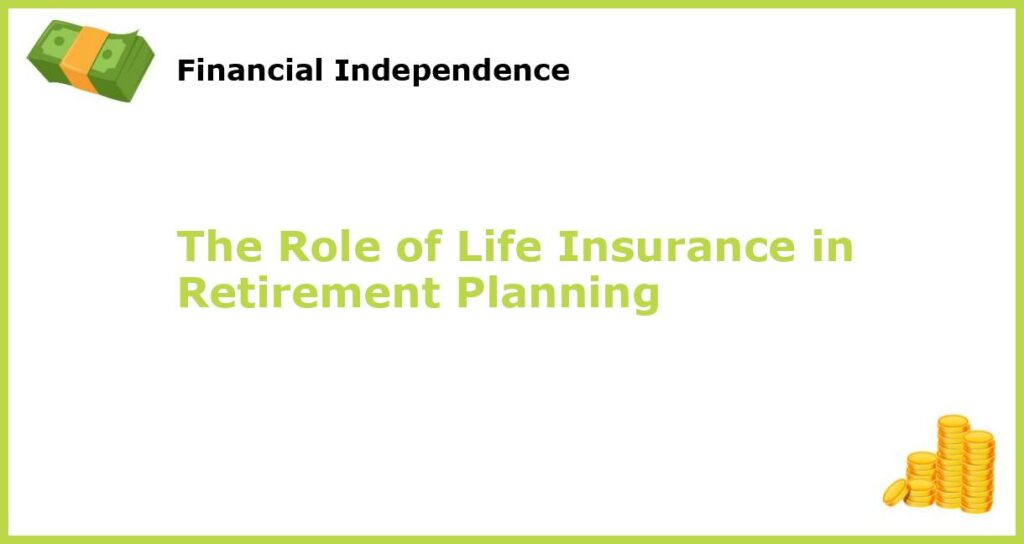Retirement planning can be overwhelming and confusing, but it is essential for ensuring a comfortable life after you stop working. One crucial aspect of retirement planning is life insurance. Though it may not be the most exciting topic, life insurance is critical to secure your future and protect your loved ones after you are gone.
Understanding Life Insurance

Life insurance is a contractual agreement between you and an insurance company. The objective of this agreement is to provide compensation or benefits to the named beneficiaries upon the policyholder’s death. The policyholder makes regular payments, known as premiums, in exchange for a guaranteed payout to their beneficiaries upon their death. Life insurance is a vital component of retirement planning because it can provide financial security for your loved ones, pay off debts, or cover end-of-life expenses.
Types of Life Insurance

Life insurance can be divided into two primary categories – term and whole life. Term life insurance provides coverage for a specific period, ranging from 10 to 30 years, and pays a death benefit if the policyholder passes away while the term is active. In contrast, whole life insurance, also called permanent life insurance, covers you for your entire life and includes a cash value component. The cash value component serves as a savings account that earns a fixed interest rate over time. The beneficiary receives both the death benefit, as well as any accumulated cash value if the policyholder dies while the policy is active.
The Benefits of Life Insurance for Retirement Planning

There are numerous benefits of life insurance for retirement planning, such as providing a source of tax-free income to your beneficiaries, paying off outstanding debts, and providing financial support for your loved ones after you are gone. Life insurance can also be an effective tool for funding charitable donations through the purchase of a life insurance policy, naming a charity as the beneficiary.
Life Insurance and Estate Planning
Life insurance can serve as a significant tool for estate planning for people with substantial estate holdings. For example, life insurance payouts can provide liquidity for your estate, allowing your heirs to pay estate taxes and distribute assets as you intended. This type of insurance policy can also help protect any closely held businesses or protect assets that may be difficult to liquidate, such as real estate.
Factors to Consider
Selecting an appropriate life insurance policy requires careful consideration of various factors, such as your age, health, and financial situation. Additionally, you must determine how much coverage you need, the type of policy that suits your needs, and fits into your budget. If you’re young, healthy, and have a relatively low income, a term life insurance policy may be the best option. For older individuals or those with substantial assets, a whole life insurance policy may be the better choice.
Working with Insurance Agents
Working with a qualified insurance agent can make the process of obtaining life insurance less stressful. An insurance agent can provide valuable insight into the different types of policies available, help you determine the best options for your situation, and explain complex insurance concepts. An agent can also help design a policy tailored to your specific circumstances and identify any potential problems or funding gaps in your current retirement and estate plan.
The Cost of Life Insurance
Life insurance premiums can vary greatly depending on the type of policy, your age, and your health conditions. The younger and healthier you are, the lower your premiums, which is why many financial advisors recommend purchasing life insurance when you are young and healthy. However, many factors can affect your life insurance premiums, so it is essential to shop around and compare prices from different providers to get the best deal.
Adding Life Insurance to Your Retirement Plan
If you have not already done so, it is essential to add life insurance to your retirement plan. Discuss your options with a qualified insurance agent to determine the type and amount of coverage that is right for you. Remember, life insurance is an investment in your future and can provide invaluable financial security for your loved ones after you are gone.
Planning for the Future
Retirement planning can be a daunting task, but it is essential to ensure a comfortable and secure future for yourself and your loved ones. Adding life insurance to your retirement plan can provide valuable financial security and peace of mind for both you and your beneficiaries. Remember, the earlier you plan for retirement, the easier it will be to achieve your financial goals and live the lifestyle you desire while minimizing the burden on your loved ones.







